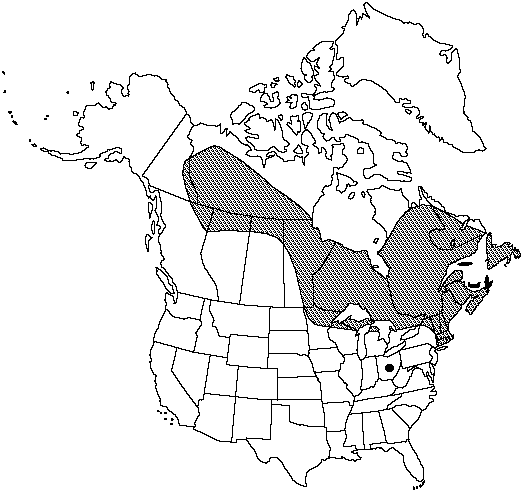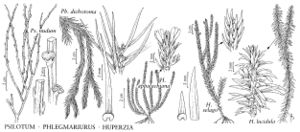FNA>Volume Importer |
FNA>Volume Importer |
| Line 26: |
Line 26: |
| | }}<!-- | | }}<!-- |
| | | | |
| − | --><span class="statement" id="st-d0_s0" data-properties="shoot orientation;shoot development;shoot some measurement;shoot growth form or orientation"><b>Shoots </b>erect, indeterminate, 8–12 cm, becoming short-decumbent;</span> <span class="statement" id="st-d0_s1" data-properties="leaf size;portion life cycle;portion life cycle">leaves of mature portion slightly smaller than leaves of juvenile portion (more pronounced in sun form);</span> <span class="statement" id="st-d0_s2" data-properties="constriction prominence;constriction duration;constriction count">indistinct annual constrictions present (more pronounced in shade form);</span> <span class="statement" id="st-d0_s3" data-properties="growth life cycle;growth orientation">juvenile growth erect.</span> <span class="statement" id="st-d0_s4" data-properties="leaf orientation;leaf orientation;leaf orientation;leaf orientation;leaf coloration;leaf coloration;leaf coloration;leaf reflectance;portion life cycle;portion life cycle"><b>Leaves </b>spreading-ascending (shade) to appressed-ascending (sun) in mature portion, more reflexed in juvenile portion, green (shade) to yellow-green (sun), lustrous;</span> <span class="statement" id="st-d0_s5" data-properties="largest leaf shape;largest leaf width;largest leaf some measurement">largest leaves triangular, widest at base, 4–7.5 mm;</span> <span class="statement" id="st-d0_s6" data-properties="smallest leaf shape;smallest leaf some measurement">smallest leaves lanceolate, 3.5–5 mm;</span> <span class="statement" id="st-d0_s7" data-properties="margin architecture or shape;margin relief">margins almost entire, papillate;</span> <span class="statement" id="st-d0_s8" data-properties="stomate count;adaxial surface count;leaf count">stomates on both surfaces, numerous on adaxial surface, 30–90 per 1/2 leaf.</span> <span class="statement" id="st-d0_s9" data-properties="branchlet architecture;pseudowhorl count;growth duration"><b>Gemmiferous </b>branchlets produced in 1 pseudowhorl at end of annual growth;</span> <span class="statement" id="st-d0_s10" data-properties="gemma length;gemma width;lateral leaf width;lateral leaf shape">gemmae 4–5 X 3–4.5 mm, lateral leaves 1.5–2 mm wide, broadly acute.</span> <span class="statement" id="st-d0_s11" data-properties="spore some measurement;2n chromosome count"><b>Spores </b>29–37 µm. <b>2n</b> = 268.</span><!-- | + | --><span class="statement" id="st-undefined" data-properties=""><b>Shoots </b>erect, indeterminate, 8–12 cm, becoming short-decumbent; leaves of mature portion slightly smaller than leaves of juvenile portion (more pronounced in sun form); indistinct annual constrictions present (more pronounced in shade form); juvenile growth erect. <b>Leaves</b> spreading-ascending (shade) to appressed-ascending (sun) in mature portion, more reflexed in juvenile portion, green (shade) to yellow-green (sun), lustrous; largest leaves triangular, widest at base, 4–7.5 mm; smallest leaves lanceolate, 3.5–5 mm; margins almost entire, papillate; stomates on both surfaces, numerous on adaxial surface, 30–90 per 1/2 leaf. <b>Gemmiferous</b> branchlets produced in 1 pseudowhorl at end of annual growth; gemmae 4–5 × 3–4.5 mm, lateral leaves 1.5–2 mm wide, broadly acute. <b>Spores</b> 29–37 µm. <b>2n</b> = 268.</span><!-- |
| | | | |
| | -->{{Treatment/Body | | -->{{Treatment/Body |
| Line 55: |
Line 55: |
| | |publication year=1829 | | |publication year=1829 |
| | |special status= | | |special status= |
| − | |source xml=https://jpend@bitbucket.org/aafc-mbb/fna-fine-grained-xml.git/src/287ef3db526bd807d435a3c7423ef2df1e951227/V2/V2_3.xml | + | |source xml=https://jpend@bitbucket.org/aafc-mbb/fna-data-curation.git/src/9216fc802291cd3df363fd52122300479582ede7/coarse_grained_fna_xml/V2/V2_3.xml |
| | |genus=Huperzia | | |genus=Huperzia |
| | |species=Huperzia selago | | |species=Huperzia selago |
| − | |2n chromosome count=268
| |
| − | |adaxial surface count=30;90
| |
| − | |branchlet architecture=gemmiferous
| |
| − | |constriction count=present
| |
| − | |constriction duration=annual
| |
| − | |constriction prominence=indistinct
| |
| − | |gemma length=4mm;5mm
| |
| − | |gemma width=3mm;4.5mm
| |
| − | |growth duration=annual
| |
| − | |growth life cycle=juvenile
| |
| − | |growth orientation=erect
| |
| − | |largest leaf shape=triangular
| |
| − | |largest leaf some measurement=4mm;7.5mm
| |
| − | |largest leaf width=widest
| |
| − | |lateral leaf shape=acute
| |
| − | |lateral leaf width=1.5mm;2mm
| |
| − | |leaf coloration=green;yellow-green
| |
| − | |leaf count=1/2
| |
| − | |leaf orientation=reflexed;spreading-ascending;appressed-ascending
| |
| − | |leaf reflectance=lustrous
| |
| − | |leaf size=slightly smaller
| |
| − | |margin architecture or shape=entire
| |
| − | |margin relief=papillate
| |
| − | |portion life cycle=juvenile;mature;juvenile;mature
| |
| − | |pseudowhorl count=1
| |
| − | |shoot development=indeterminate
| |
| − | |shoot growth form or orientation=short-decumbent
| |
| − | |shoot orientation=erect
| |
| − | |shoot some measurement=8cm;12cm
| |
| − | |smallest leaf shape=lanceolate
| |
| − | |smallest leaf some measurement=3.5mm;5mm
| |
| − | |spore some measurement=29um;37um
| |
| − | |stomate count=numerous
| |
| | }}<!-- | | }}<!-- |
| | | | |
| | -->[[Category:Treatment]][[Category:Huperzia]] | | -->[[Category:Treatment]][[Category:Huperzia]] |
Shoots erect, indeterminate, 8–12 cm, becoming short-decumbent; leaves of mature portion slightly smaller than leaves of juvenile portion (more pronounced in sun form); indistinct annual constrictions present (more pronounced in shade form); juvenile growth erect. Leaves spreading-ascending (shade) to appressed-ascending (sun) in mature portion, more reflexed in juvenile portion, green (shade) to yellow-green (sun), lustrous; largest leaves triangular, widest at base, 4–7.5 mm; smallest leaves lanceolate, 3.5–5 mm; margins almost entire, papillate; stomates on both surfaces, numerous on adaxial surface, 30–90 per 1/2 leaf. Gemmiferous branchlets produced in 1 pseudowhorl at end of annual growth; gemmae 4–5 × 3–4.5 mm, lateral leaves 1.5–2 mm wide, broadly acute. Spores 29–37 µm. 2n = 268.
Habitat: Terrestrial in sandy borrow pits, ditches, lakeshore swales, and conifer swamps, rarely on acidic, igneous rock or calcareous coast cliffs
Elevation: 0–700 m, rarely to 1600 m
Distribution
St. Pierre and Miquelon, Alta., B.C., Man., N.B., Nfld., N.W.T., N.S., Ont., P.E.I., Que., Sask., Yukon, Conn., Maine, Mass., Mich., Minn., N.H., N.Y., Ohio, R.I., Vt., Wis., Europe, Asia.
Discussion
Plants from Greenland formerly identified as Huperzia selago are H. appalachiana.
Selected References
None.

